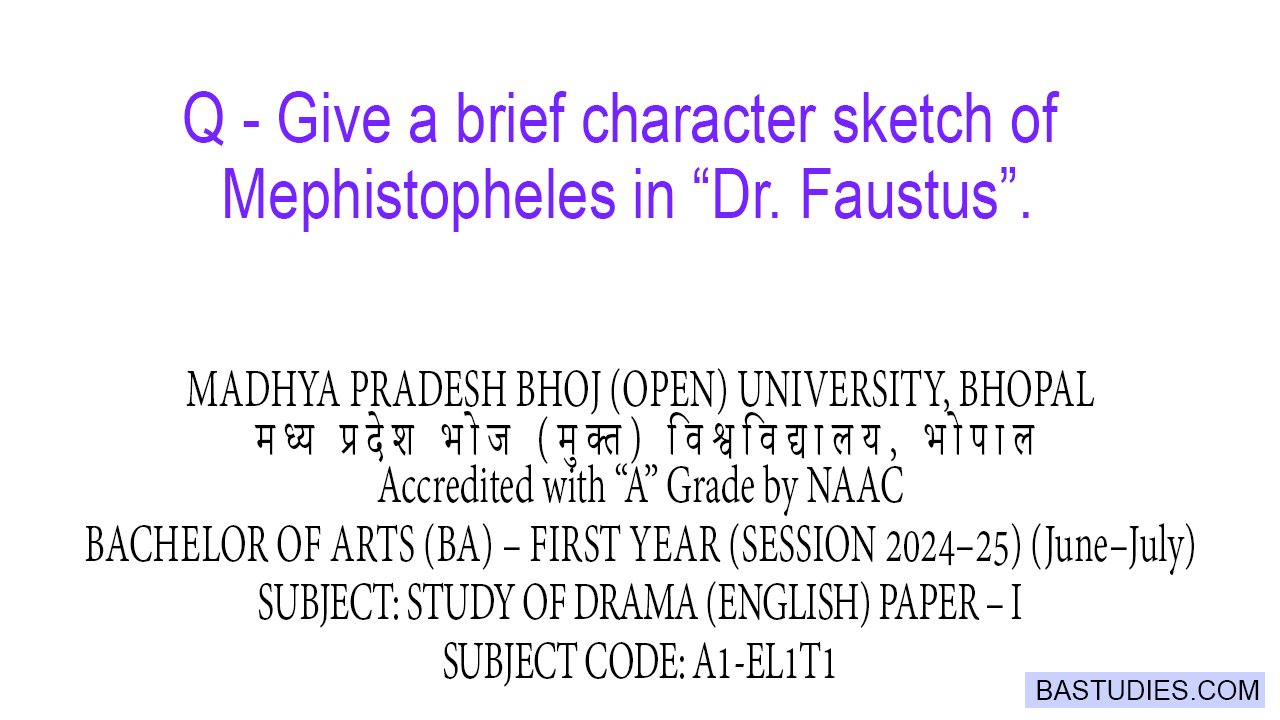Give a brief character sketch of Mephistopheles in Dr Faustus
Q- Give a brief character sketch of Mephistopheles in “Dr. Faustus”.
ANSWER –
Character Sketch of Mephistopheles in Doctor Faustus
Mephistopheles is one of the central characters in Christopher Marlowe’s famous tragedy Doctor Faustus. He is a demon who serves Lucifer, the ruler of Hell. When Faustus calls upon dark forces using magic, it is Mephistopheles who appears to answer his call. Throughout the play, Mephistopheles remains Faustus’s companion, guide, and ultimately, the agent of his damnation.
Servant of Lucifer, Yet Intelligent and Powerful
Mephistopheles is not an independent devil, but a loyal servant to Lucifer. His primary role is to collect souls for his master. However, he is not portrayed as a mere brute or mindless demon. Instead, Mephistopheles is highly intelligent, well-spoken, and philosophical. He impresses Faustus with his knowledge of heaven, hell, cosmology, and theology. His intelligence is one of the tools he uses to manipulate Faustus.
Cunning, Persuasive, and Deceptive
Mephistopheles is a master manipulator. Once Faustus shows interest in gaining power through necromancy, Mephistopheles skillfully tempts him with illusions of grandeur—offering him magical powers, riches, and pleasures of the world. He shows Faustus the joys of power but hides the eternal cost. Even though Faustus believes he is in control of the situation, it is Mephistopheles who constantly guides him down the path of destruction.
He provides entertainment, summons famous spirits like Helen of Troy, and distracts Faustus from repentance at critical moments. He always keeps Faustus busy with trivial magical tricks and shallow experiences, never allowing him to reflect deeply or seek redemption.
Philosophical and Emotionally Complex
What makes Mephistopheles more than just a villain is his philosophical depth. He explains the nature of hell not only as a place of punishment but also as a mental and spiritual state. His famous line:
“Why, this is hell, nor am I out of it.”
reveals that even when he is not physically in hell, he suffers because he is eternally separated from God. This adds a tragic dimension to his character, suggesting that Mephistopheles was once an angel, full of divine glory, but fell from grace. Now, he lives in eternal regret, even if he does not openly show it often.
A Warning in Disguise
Interestingly, Mephistopheles does not initially come to Faustus when he summons him. He explains that he came only because Faustus blasphemed against God, which draws evil spirits. Moreover, he tries to warn Faustus not to make a pact with Lucifer by revealing the horrors of hell. But Faustus is blinded by pride and ambition.
In this way, Mephistopheles can be seen not only as a tempter but also as a subtle warning figure. He becomes the mirror in which Faustus might have seen his own future—but Faustus fails to understand it.
Symbol of Temptation and Damnation
Mephistopheles symbolizes the seductive power of evil. His charming words and tempting offers represent how easily human beings can be drawn away from virtue in search of power, fame, and pleasure. He is both the instrument and symbol of Faustus’s fall. Though he never forces Faustus, he influences him constantly—making evil seem attractive and repentance seem impossible.
Conclusion
In Doctor Faustus, Mephistopheles is a complex and powerful figure. He is not a one-dimensional villain, but a character full of knowledge, irony, and internal suffering. He plays a crucial role in the moral and spiritual downfall of Faustus, acting both as his companion and destroyer. Through Mephistopheles, Marlowe explores themes of temptation, sin, eternal damnation, and the tragic consequences of human pride. His character remains one of the most memorable and multi-layered in Elizabethan drama.
READ ALSO – Write a short note on Greek Tragedy

1 thought on “Give a brief character sketch of Mephistopheles in Dr Faustus”